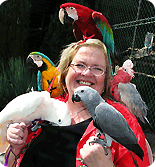Why does my cockatiel keep picking?

Hi Dr. Cook, One of my cockatiels has been “picking” at her back - an area right between her wing couplings - for about 3 months now. If left to it, she will chew until it bleeds. She is not plucking feathers, just chewing on the down and then the skin underneath.
It seems to bother her most in the evenings. Both our cockatiels (no other pets or children in the house) get plenty of attention and have lots to do during the day, foraging, playing with toys, being out in their aviary, etc. They also eat very well, with a variety of fresh vegetables and fruits in their diets, and get plenty of sleep. They don’t bathe as often as I would like, but we manage it every couple of weeks or so. We run a humidifier in their sleeping room during the day and try to keep it up around 45%. (They are about a year and a half old.)
I have taken her to our local avian vet, who ran some tests to look for infections and inspected her for lice and mites, but found none. He was puzzled because she otherwise seemed in good health.
He advised there could be a myriad of explanations - many of them difficult to diagnose - and suggested it might be behavioural, so we have been doing our best to interrupt her activity. He also warned to watch how we do so, as we might be reinforcing the behaviour.
We have tried applying aloe to the area, but it only seemed to make her do it more so we stopped.
After observing her for some time, I began to wonder if perhaps it was an allergy, and have taken all wheat products out of her diet. It has been 4 weeks now and I have seen no changes in the behaviour, and I am wondering just how long I should wait to get it completely out of her system. Both our birds do so enjoy their (whole wheat) bread and pasta treats, and I hated taking it away, but will do so if that turns out to be the culprit.
Can you make any suggestions as to a reasonable time? Thank you so much for your insights!
Michelle

Hi Michelle, Thanks for the great question! I have a ‘tiel we rescued at my clinic that did the same thing as your bird; with proper diet and medication, her symptoms resolved in about three months, so there is hope for your bird.
This type of self-injurious behavior seen in cockatiels is often a symptom of physical disease. Food allergies would be much less likely to cause these symptoms, so I would allow your birds to have wheat again. A varied diet with a base of at least 70% pellets is best for parrots. Frequent bathing is essential for birds with feather issues, as this encourages normal preening. I recommend bathing or misting daily with plain, lukewarm water. I also advocate supplementation of the diet with omega-3,-6 fatty acids and natural sunlight at least three times weekly, plus a program of positive reinforcement to teach behaviors (such as tricks) to refocus the bird from self-injurious behavior.
Your avian veterinarian has wisely ruled out external parasites. I also recommend checking for internal parasites (such as Giardia), a complete blood count and chemistry profile and possibly a viral panel.
Good luck with your ‘tiel!

































